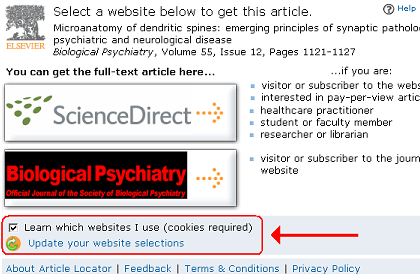Last week a user reported that he was asked for a login while trying to access a specific full text via a link provided by the MPG/SFX server. "A typical IP access problem", I hear you say, but the issue became more complicated soon. Further debugging indicated that
- the full text was available on Elsevier’s ScienceDirect platform and the user was able to access it by browsing to the article directly.
- the local librarian was correctly guided to the full text as she entered the same OpenURL and followed the steps taken by the user.
- the doi link created by the MPG/SFX link resolver was redirected to Elsevier’s Article Locator, but the intermediate page was displayed to the librarian only.
- the website selection screen enables users to "learn" which websites they use by setting a browser cookie:

… and that was exactly what happened to our user. Arriving to Elsevier’s Article Locator for the first time, he accidentally selected the "wrong" website and by doing so he removed the ScienceDirect platform from his preferences. Afterwards, he was not able to return to the intermediate page because he was automatically redirected to the article in his "preferred" Elsevier website.
Allowing users to set preferences is a commendable idea in general, but this implementation falls a bit short. While trying to access a full text, scientists do not read instructions very carefully, but attempt to click through as fast as possible. With setting cookies by default, they may unintentionally been pushed into a dead end.
After clarifying the problem, it was easy to provide a solution: The user could either open Elsevier’s preference page to update his website selections or delete the cookies stored by his browser.
But this issue was an important lesson for us SFX administrators as well. We need to avoid intermediate screens whenever possible, e.g. by configuring institutional preferences. Elsevier offers a cookie pusher for this task. The MPG/SFX link resolver already use it under certain conditions, but the implementation needs to be extended.



